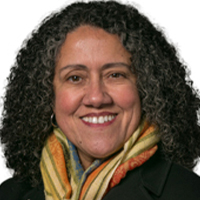
Ashley Siefert Nunes
Astrid Caldas is a senior climate scientist for community resilience with the Climate & Energy program at the Union of Concerned Scientists. Her work focuses on community resilience, science communication, environmental justice, and equitable climate-related policies with practical implications for nature and society.
Before joining UCS, Dr. Caldas was a Science & Technology Policy Fellow at the American Association for the Advancement of Science, a climate change and wildlife science fellow at the nonprofit conservation group Defenders of Wildlife, and a research scientist at the University of Maryland. Dr. Caldas has advised or consulted on projects with organizations including the Smithsonian Institution and the National Socio-Environmental Synthesis Center. She has a lifelong passion for butterflies and moths, which she has studied for many years and likes to use as models to raise awareness of climate and land use changes.
Dr. Caldas holds a Ph.D. in ecology from the Universidade Estadual de Campinas in the state of São Paulo, Brazil. In addition to a M.S. in entomology from the Universidade Federal do Paraná, Brazil, she earned an M.S. in environmental management from the University of Maryland Global Campus.
She has brought word of the science behind climate change impacts to town halls, community centers, student panels, retirement homes, faith communities, grassroots groups, rallies, and anything in between. She has been quoted widely, including in The New York Times, People Magazine, The Wall Street Journal, The Washington Post, USA Today, Huffington Post, Christian Science Monitor, Daily Press, Time Science, CNBC, Gizmodo, and Mashable, and has appeared on numerous NPR stations, TRT World, CBS, NBC, Fox, Univisión, and Telemundo. Her Twitter handle is @climategeek.
Selected publications
Caldas, A. (contributing author) in Leite, F., Meyer, M., Watson, M. et al. 2022. Moving Resilience Research to Action in The Gulf Coast. National Science Foundation-funded workshop white paper. University Of Texas, 39p.
Kruczkiewicz, A.; Cian, F. Caldas, A. et al. 2022. Multiform Flood Risk in a Rapidly Changing World. Environmental Research Letters 17, 081001.
Phillips, C.A., Astrid Caldas, Rachel Cleetus, et al. 2020. Compound climate risks in the COVID-19 pandemic. Nature Climate Change 10, 586–588.
Delach, A., Caldas, A., Edson, K.M. et al. 2019. Agency plans are inadequate to conserve US endangered species under climate change. Nature Climate Change 9, 999–1004.
Dahl, K.; Spanger-Siegfried, E.; Licker, R.; Caldas, A; et al. 2019. Killer Heat in the United States: Climate Choices and the Future of Dangerously Hot Days. Cambridge, MA: Union of Concerned Scientists.
Dahl, K., Spanger-Siegfried, E., Caldas, A., Udvardy, S. 2018. Underwater: Rising Seas, Chronic Floods, and the Implications for US Coastal Real Estate. Cambridge, MA: Union of Concerned Scientists.
Dahl, K., Spanger-Siegfried, E., Caldas, A., Udvardy, S. 2017. Effective inundation of continental United States communities with 21st century sea level rise (submitted). Elem Sci Anth 5:37
Markham, A., Osipova, E., Lafrenz Samuels, K. and Caldas, A. 2016. World Heritage and Tourism in a Changing Climate. United Nations Environment Programme, Nairobi, Kenya and United Nations Educational, Scientific and Cultural Organization, Paris, France.
Caldas, A. 2014. Species traits of relevance for climate vulnerability and the prediction of phenological responses to climate change. Journal of the Lepidopterists’ Society 68(3):197-202
